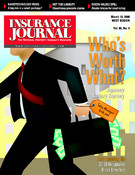Car insurance rates for Colorado drivers on average have dropped 35 percent since the state changed its auto insurance system nearly five years ago, according to an independent study released by Gov. Bill Ritter’s office.
That means drivers are paying $322 less per car, per year for auto insurance in December 2007 than they were in July 2003. Meanwhile, the state’s national ranking for the cost of auto insurance fell from ninth highest in 2002 to 21st in 2005.
Last November, the governor’s office commissioned BBC Research and Consulting to answer questions about the effects of Colorado’s change from a no-fault auto insurance system nearly five years ago, which mandated extra medical benefits that duplicated many consumers’ health benefits, to a fault-based or tort system that is used in 37 other states. The study gathered available data to examine the impact on auto insurance, health insurance, hospitals, first responders, Medicaid and consumers. Representatives of the auto insurance industry and trauma care community provided information, data and input for the study.
Auto insurance companies felt it was in the best interests of their customers to assist Gov. Ritter in analyzing objective data and factors that have resulted since the change in insurance systems.
“This study shows that consumers are paying significantly less for insurance,” said Kelly Campbell, regional manager for the Property Casualty Insurers Association of America (PCI). “Five years ago auto insurance rates were spiraling upward by double-digits. Now, consumers are saving hundreds of dollars every year and have more choices regarding how they spend their money on insurance. There has been a small predicted shift to health insurance rates that amounts to about 1.6 percent, so overall the market has stabilized to the consumer’s benefit.”
Campbell noted that a new study by the Insurance Research Council, which cites information from the U.S. Department of Health and Human Services, found that Colorado’s health insurance rates are rising at a slower pace compared with national rates. “The average health insurance premium in Colorado increased less than the national average of 7 percent from 2003-2005,” said Campbell.
The BBC study also reviewed the financial impact of the five-year-old change in auto insurance systems on hospitals and first responders. Since hospitals only track inpatient numbers, the costs are based on the estimated five percent of car accident victims admitted into hospitals. Two-thirds of car crashes involve no injury and the majority of injuries that do occur are minor strains and sprains.
The report also confirmed that auto accidents and injuries are decreasing in Colorado. In 2002, Colorado acute care hospitals admitted 5,915 people due to motor vehicle accidents. In 2006, only 4,583 people were admitted because of injuries in crashes.
While the report found that overall hospital reimbursements for inpatients were down by $85 million, Colorado consumers have paid hundreds of millions of dollars less for car insurance each year since July 2003.
The researchers pointed out that the change in auto insurance also affects hospitals’ bottom lines due to the fact that the high mandated medical insurance required by the old no-fault system paid full billed charges to hospitals for treatment rather than the lower reimbursement rate paid by health insurers who negotiate much lower rates with hospitals due to their volume of cases.
Medicaid and Medicare also reimburse treatment at a lower rate. First responders reported no staffing cuts or increase in emergency response times in the years since the change in auto insurance law.
State insurance association representatives agreed the study is helpful to put data and issues in context, but it can’t answer the most important question of what is in the best interests of individual consumers who want to choose their insurance based on their own needs and pocketbook. A recent statewide consumer poll by Talmey-Drake Research shows that 73 percent of Coloradans oppose a law requiring them to buy extra medical insurance under their car insurance.
“Consumers want to keep car insurance rates low and make their own financial decisions when it comes to insurance,” says Carole Walker, executive director of the Rocky Mountain Insurance Information Association. “More mandates will just cost drivers more money and won’t solve the larger problems of the health care system.”
Topics Trends Auto Pricing Trends
Was this article valuable?
Here are more articles you may enjoy.


 AIG’s Zaffino: Outcomes From AI Use Went From ‘Aspirational’ to ‘Beyond Expectations’
AIG’s Zaffino: Outcomes From AI Use Went From ‘Aspirational’ to ‘Beyond Expectations’  Zurich Insurance Profit Beats Estimates as CEO Eyes Beazley
Zurich Insurance Profit Beats Estimates as CEO Eyes Beazley  CFC Owners Said to Tap Banks for Sale, IPO of £5 Billion Insurer
CFC Owners Said to Tap Banks for Sale, IPO of £5 Billion Insurer  Insurance Broker Stocks Sink as AI App Sparks Disruption Fears
Insurance Broker Stocks Sink as AI App Sparks Disruption Fears 


